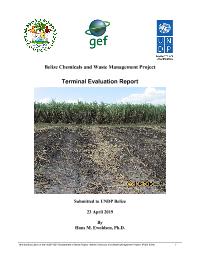
Terminal Evaluation of Belize Chemicals and Waste Management Project
Completedon 30 Apr, 2019
Evaluation Plan
Planned End Date
May 2019
Evaluation Type
Project
Management Response
Yes
Evaluation Budget
$12,000
Evaluation Title
Terminal Evaluation of Belize Chemicals and Waste Management Project
Atlas Project Number
00079317
Plan Period
Status
Completed
Type
Project
Plan Date
31 May, 2019
Completion Date
30 Apr, 2019
Budget
$12,000
Expenditure
$11,560
Source of Funding
Project
Management Response
Yes
Quality Assessment
Yes
Joint Programme
No
Joint Evaluation
No
GEF Evaluation
Yes
Expand
Stakeholders
Ministry of Fisheries, Forestry and Sustainable Development, Department of Environment, Ministry of Agriculture, Ministry of Health, Pesticides Control Board
Countries
Belize
Atlas Project Number
00079317
Plan Period
Status
Completed
Type
Project
Management Response
Yes
Plan Date
31 May, 2019
Quality Assessment
Yes
Completion Date
30 Apr, 2019
Joint Programme
No
Joint Evaluation
No
Budget
$12,000
GEF Evaluation
Yes
Expand
Expenditure
$11,560
Stakeholders
Ministry of Fisheries, Forestry and Sustainable Development, Department of Environment, Ministry of Agriculture, Ministry of Health, Pesticides Control Board
Source of Funding
Project
Countries
Belize
Output 1.4.1 Solutions scaled up for sustainable management of natural resources, including sustainable commodities and green and inclusive value chains
Goal 12. Ensure sustainable consumption and production patterns
12.4 By 2020, achieve the environmentally sound management of chemicals and all wastes throughout their life cycle, in accordance with agreed international frameworks, and significantly reduce their release to air, water and soil in order to minimize their adverse impacts on human health and the environment
1: Others
2: Sustainable


